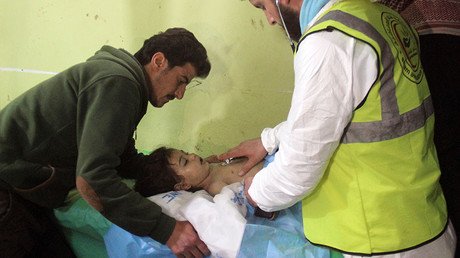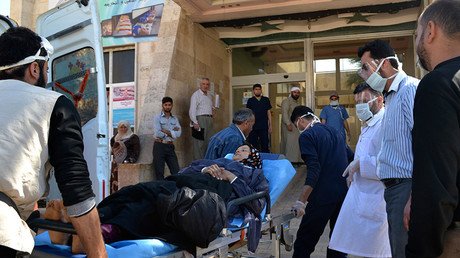Russia vetoes UNSC resolution on renewing Syria chemical weapons probe
Moscow vetoed a UN Security Council resolution to renew the mandate for a UN mission investigating the use of chemical weapons in Syria. Ahead of the vote, Russia suggested postponing the discussion, but its proposal was rejected.
The current mandate for UN and Organization for the Prohibition of Chemical Weapons (OPCW) representatives to work in Syria expires on November 17.
Washington has prepared a document to prolong the mandate, which was supported by 11 votes on Tuesday. Two UNSC members – Russia and Bolivia – voted against the document, while China and Kazakhstan abstained.
Later this week, the UN-OPCW Joint Investigative Mechanism (JIM) is scheduled to deliver a report on the alleged chemical weapon attack on the Syrian town of Khan Sheikhoun on April 4. Russia proposed hearing the mission’s findings before voting on a new document. However, Washington insisted the Security Council votes on the new mandate before a report is presented.
Describing the vote as "a directed performance," Russia's UN envoy Vasily Nebenzya said he was "amused at how some delegations had read their prepared statements condemning the use of other countries' veto power" ahead of the actual voting process.
Moscow regrets that those behind the resolution have chosen "the course of confrontation and split within the Security Council," the Russian diplomat said. Nebenzya added that Russia will get back to the issue of the probe's mandate after the JIM report is released.
The Russian Foreign Ministry has earlier said that the US demands for the prolongation of the probe "look at the very least strange."
"It is necessary to act in accordance with an established practice, when a UN structure's report is first studied, and then a question on a mandate's prolongation is discussed," the ministry said in a statement on Monday, condemning the "hyped up hysteria" on the issue.
Russia and Syria have repeatedly called on the international community to conduct a thorough and impartial investigation into the alleged sarin gas attack in the Idlib governorate, which is believed to have claimed the lives of up to 100 civilians.
Back in April, Washington launched 59 Tomahawk missiles at Syria's Shayrat Airbase in response to the alleged chemical attack, which it blamed on the Syrian government.
The previous investigation report, released by the OPCW in June, stated that traces of sarin had been found in soil samples. Commenting on the findings, Moscow warned that the report had many flaws and could not be deemed conclusive.
The JIM mission never actually visited the site of the alleged attack, Russia pointed out, saying that the experts relied on evidence collected by the militant groups controlling the area. The mission also failed to properly inspect the Shayrat Airbase, Moscow said, explaining that while the experts visited the Syrian airfield, they did not collect ground samples there.
At the time of the April attack, the area of Khan Sheikhoun was under the control of Tahrir al-Sham, better known as the Al-Nusra Front terrorist group. Last week, the US State Department admitted that militants linked to Al-Nusra Front are carrying out terrorist attacks using chemical weapons in Syria.














